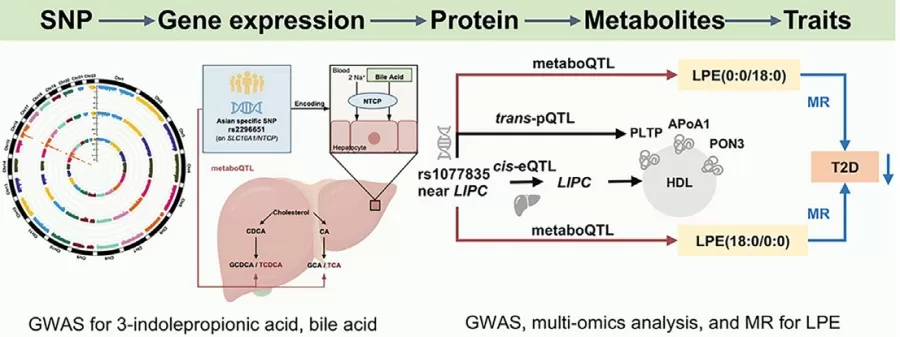Genetic Links Between Serum Metabolites and Chronic Diseases
We are excited to highlight a groundbreaking study titled “Genetic Mapping of Serum Metabolome to Chronic Diseases Among Han Chinese” published in Cell Genomics (2025). This research leveraged TM Widely-Targeted Metabolomics to analyze 2,759 serum metabolites and combined it with genome-wide association studies (GWAS) to explore the genetic architecture underlying these metabolites across 3,795 Han Chinese individuals. By integrating multi-omics data, the study identified novel genetic variants influencing metabolite levels and revealed their causal relationships with chronic diseases like type 2 diabetes (T2D) and coronary artery disease (CAD). MetwareBio’s advanced metabolomics platform played a pivotal role in profiling diverse metabolites, enabling high-precision insights into disease mechanisms.
Bridging Metabolism and Chronic Disease
Chronic diseases such as T2D and CAD are shaped by complex interactions between genetics, environment, and metabolism. Serum metabolites, as dynamic biomarkers, reflect both genetic predispositions and disease progression. However, prior studies focused predominantly on European populations, leaving Asian-specific metabolic pathways underexplored. This study combined TM Widely-Targeted Metabolomics with GWAS and Mendelian randomization (MR) to map the genetic architecture of metabolites in Han Chinese, offering unprecedented insights into disease etiology and personalized interventions.
Discovery of Novel and Ancestry-Specific Genetic Variants
Using TM Widely-Targeted Metabolomics, researchers identified 184 study-wide significant metabolite quantitative trait loci (metaboQTLs), 88.6% of which were novel. Notably, the Asian-specific variant rs2296651 in SLC10A1 was linked to bile acids like taurocholic acid, highlighting unique metabolic regulation in East Asians. Cohort-specific analyses utilized MetwareBio’s platform to ensure robust metabolite quantification, enabling the detection of rare variants with major metabolic effects.
Causal Links Between Metabolites and Diseases via MR Analysis
Mendelian randomization revealed 906 potential causal relationships between metabolites and 37 clinical traits. For instance, elevated lysophosphatidylethanolamine (LPE) levels were genetically associated with reduced T2D risk. This finding was validated using targeted metabolomics in the Guangzhou Nutrition and Health Study cohort, underscoring the reproducibility of results across platforms.

Key Analytical Insights
Multi-Omics Integration Uncovers Regulatory Pathways
By combining proteomics and transcriptomics data, the study mapped genetic variants to functional pathways. For example, the LIPC locus influenced both lipid metabolism proteins (e.g., APOA1) and LPE levels, illustrating how genetic regulation cascades from genes to metabolites and disease phenotypes. Such integration highlights the power of multi-omics approaches in dissecting complex biological networks.

Outcome Overview
Why This Study Matters
This research marks a milestone in understanding Asian-specific metabolic dysregulation. Key innovations include:
1. Population-Specific Insights: The identification of ancestry-specific variants addresses a critical gap in global metabolomics research.
2. Translational Potential: MR-derived causal relationships (e.g., astaxanthin’s protective role in CAD) offer targets for dietary or therapeutic interventions.
3. Technical Excellence: The use of TM Widely-Targeted Metabolomics and targeted metabolomics ensured high sensitivity and reproducibility, crucial for large-scale biomarker discovery.
Metabolomics, combined with genomics, is reshaping precision medicine. Future studies could expand to microbiome interactions or longitudinal metabolite profiling to capture dynamic disease progression.
Advance Your Research with MetwareBio’s Expertise
At MetwareBio, we empower cutting-edge research through state-of-the-art metabolomics solutions:
TM Widely-Targeted Metabolomics: Detect over 2,000 metabolites with unmatched accuracy.
Customized Multi-Omics Integration: Combine metabolomics with genomics, proteomics, and transcriptomics for holistic insights.
End-to-End Support: From experimental design to data analysis, our expert team ensures seamless project execution.
Unlock the secrets of metabolism. Partner with precision. Partner with MetwareBio.


